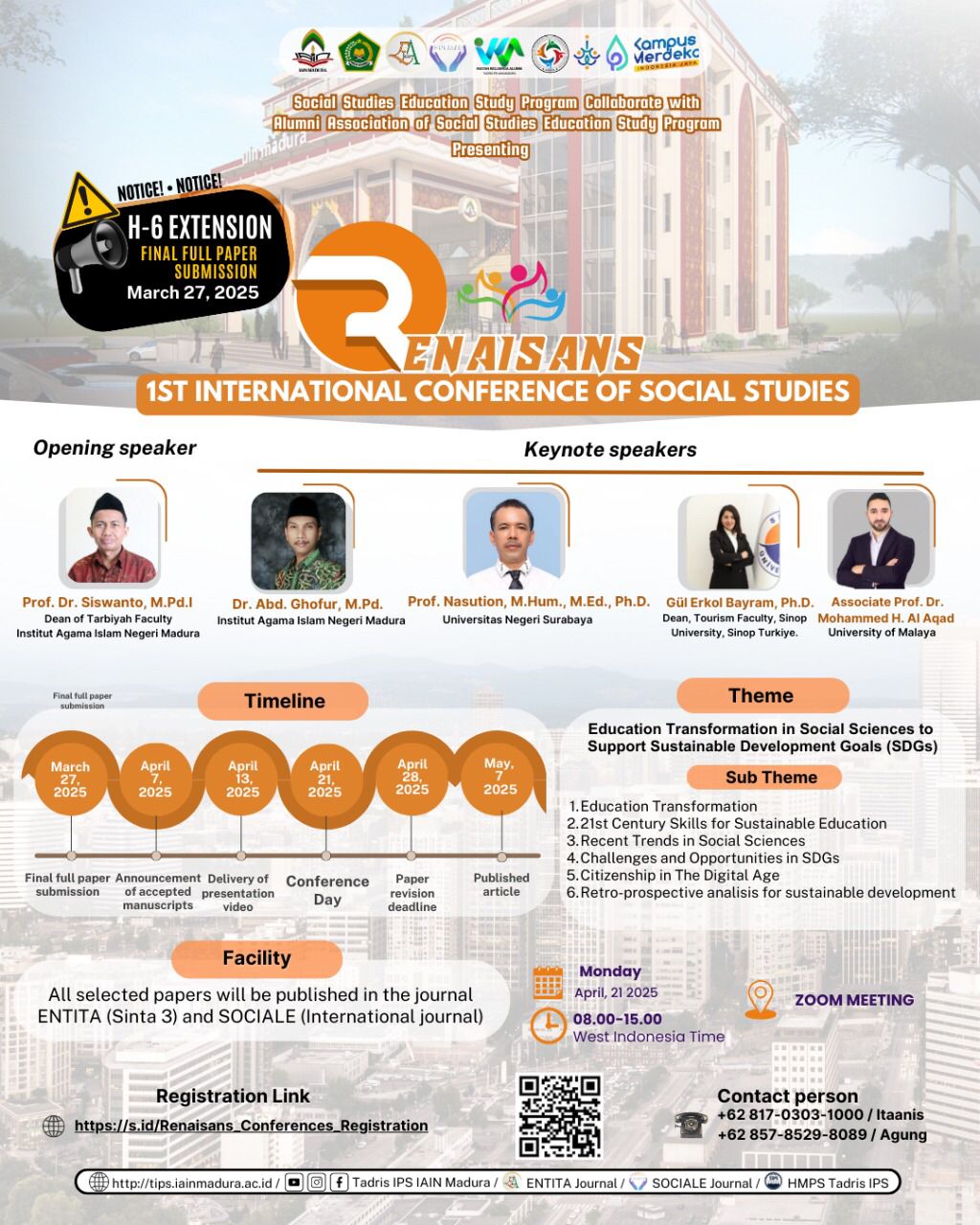The Effect of The Process oriented Guided Inquiry Learning (Pogil) Learning Model on Social Literacy Abilities
 Abstract views: 3
,
Abstract views: 3
,
 PDF downloads: 3
PDF downloads: 3
Abstract
This study aims to investigate the effect of the Process Oriented Guided Inquiry Learning (POGIL) model on students' social literacy abilities. The background of this research is the increasing need for students to develop social literacy skills, which encompass critical thinking, communication, empathy, and active participation in societal issues. Traditional teaching methods often fail to foster these skills, thus hindering students' ability to engage with social challenges. POGIL, an inquiry-based learning model, emphasizes active student participation and collaboration, making it a promising approach for enhancing social literacy. This research employed a pre-experimental design with a one-group pretest-posttest design to evaluate the effectiveness of POGIL in improving social literacy. The sample consisted of second-grade elementary school students. Data were collected through pretest and posttest assessments, along with observational checklists. The results indicated a significant improvement in students' social literacy abilities after the implementation of POGIL. The average score of social literacy increased from 36.3% in the pretest to 86.8% in the posttest. This suggests that the POGIL model is effective in enhancing students' understanding of social issues, their ability to empathize, collaborate, and communicate effectively in social contexts.
Downloads
References
Hanson, D. (2014). Process Oriented Guided Inquiry Learning (POGIL): A Review of Literature. Journal of Chemical Education, 91(10), 1568-1575. https://pubs.acs.org/doi/abs/10.1021/ed400911z
Ikwan Wahyudi. (2022). Meta-analisis Penerapan Model Process Oriented Guided Inquiry Learning (POGIL) dalam Pembelajaran IPA. Natural Science: Jurnal Penelitian Bidang IPA dan Pendidikan IPA, volume 8, nomor 2.
Johnson, D. W., Johnson, R. T., & Smith, K. A. (1998). Active Learning: Cooperation in the College Classroom. Interactive Learning Environments, 4(1), 15-25. https://www.researchgate.net/publication/220702965_Active_learning_Cooperation_in_the_college_classroom
McKenna, M., & Robinson, R. (2018). Teaching literacy in the 21st century. Pearson Education. https://www.pearson.com/store/p/teaching-literacy-in-the-21st-century/P100000857182
Ni Putu Yuliani, Gede Margunayasa, dan Desak Putu Parmiti. (2017). PENGARUH MODEL PEMBELAJARAN POGIL BERBANTUAN PETA PIKIRAN TERHADAP HASIL BELAJAR IPA SISWA KELAS V SD. Journal of Education Technology 1, no. 2. https://doi.org/10.23887/jet.v1i2.11773.
OECD. (2020). The future of education and skills 2030: OECD education framework https://www.oecd.org/education/2030-project/
Richard dan James. (2008). Process Oriented Guided Inquiry Learning. American Chemical Society: Oxford University Press.
Rustam, Agus Ramdani, dan Prapti Sedijani. (2017) PENGARUH MODEL PEMBELAJARAN PROCESS ORIENTED GUIDED INQUIRY LEARNING (POGIL) TERHADAP PEMAHAMAN KONSEP IPA, KETERAMPILAN PROSES SAINS DAN KEMAMPUAN BERPIKIR KRITIS SISWA SMP NEGERI 3 PRINGGABAYA LOMBOK TIMUR. Jurnal Penelitian Pendidikan IPA 3, no. 2. https://doi.org/10.29303/jppipa.v3i2.90.
Saomah, F. (2017). Literasi sosial dan dampaknya terhadap pengembangan kompetensi siswa. Jurnal Pendidikan dan Sosial, 17(1), 22–34. https://journal.stkippgribojonegoro.ac.id/index.php/jps/article/view/145
UNESCO. (2014). Global Citizenship Education: Preparing Learners for the Challenges of the 21st Century. Paris: UNESCO. https://unesdoc.unesco.org/ark:/48223/pf0000227729
Vygotsky, L. S. (1978). Mind in Society: The Development of Higher Psychological Processes. Harvard University Press.
Yunia, Elisabeth, I Wayan Dasna, dan Herawati Susilo. (2016). Pemberdayaan Keterampilan Proses Sains Melalui POGIL (Process Oriented Guided Inquiry Learning). https://doi.org/Elisabeth-Y.-S.-S.-899-911.pdf
Zamista, Adelia Alfama. (2016) PENGARUH MODEL PEMBELAJARAN PROCESS ORIENTED GUIDED INQUIRY LEARNING TERHADAP KETERAMPILAN PROSES SAINS DAN KEMAMPUAN KOGNITIF SISWA PADA MATA PELAJARAN FISIKA. EDUSAINS 7, no. 2. https://doi.org/10.15408/es.v7i2.1815.
Copyright (c) 2025 Entita: Jurnal Pendidikan Ilmu Pengetahuan Sosial dan Ilmu-Ilmu Sosial

This work is licensed under a Creative Commons Attribution-NonCommercial 4.0 International License.
ENTITA: Jurnal Pendidikan Ilmu Pengetahuan Sosial dan Ilmu-Ilmu Sosial operates an Open Access policy under a Creative Commons Non-Commercial 4.0 International license. Authors who publish with this journal agree to the following terms:
- The copyright of the received article once accepted for publication shall be assigned to the journal as the publisher with licensed under a

- Journal is able to enter into separate, additional contractual arrangements for the non-exclusive distribution of the journal's published version of the work (e.g., post it to an institutional repository or publish it in a book), with an acknowledgement of its initial publication in this journal.
- Journal is permitted and encouraged to post their work online (e.g., in institutional repositories or on their website) prior to and during the submission process, as it can lead to productive exchanges, as well as earlier and greater citation of published work (see The Effect of Open Access).
- Here is Copyright Transfer Form that author can download and send to OJS during submission.

















